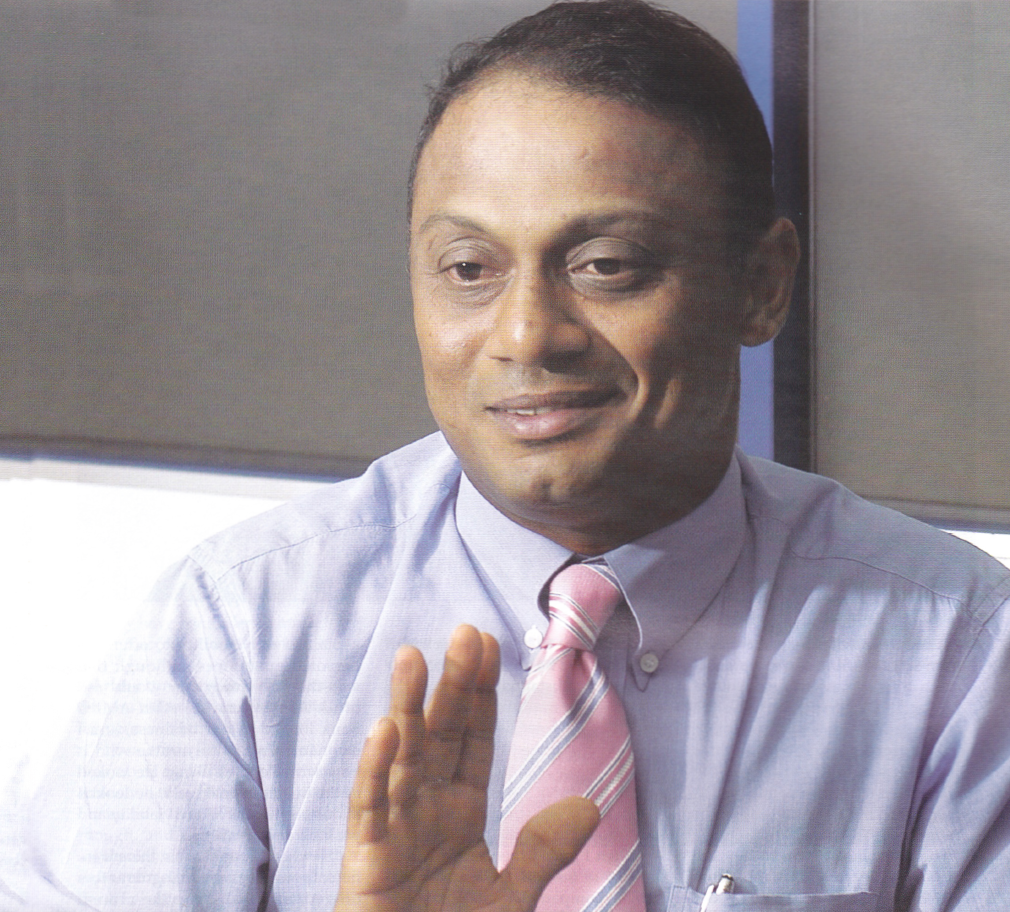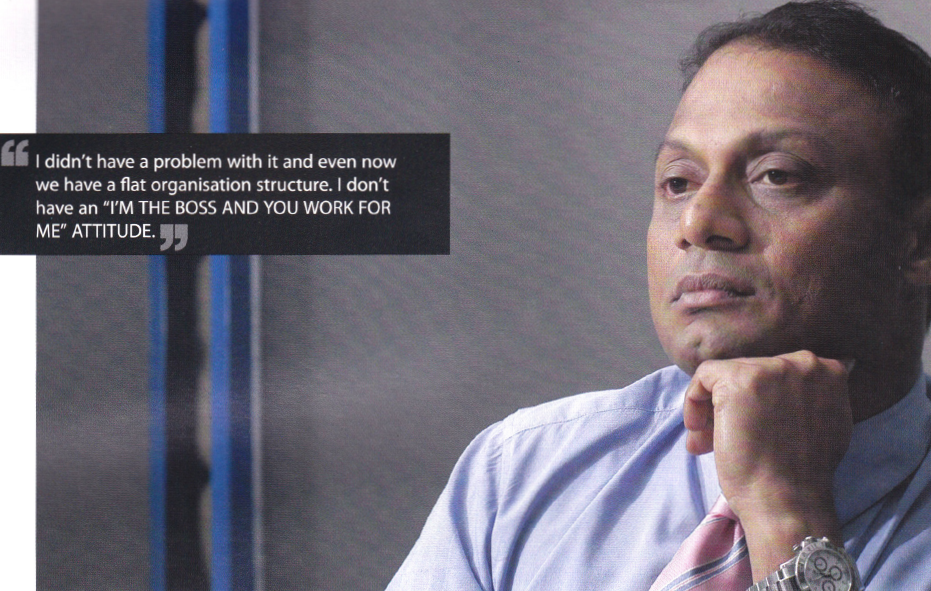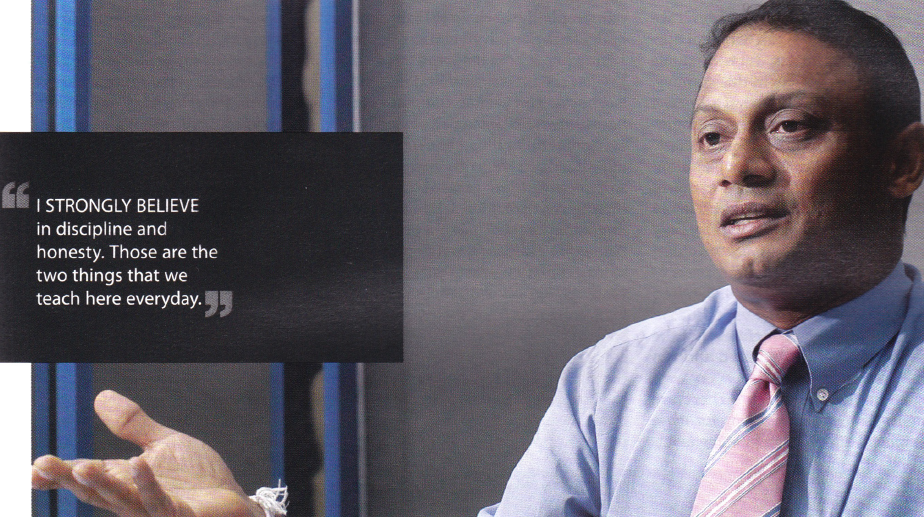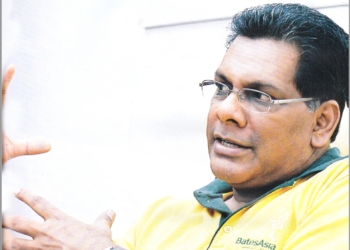SANJEEWA WICKRAMANAYAKE, Chairman of Ewis Solutions and Toppan Forms, Colombo, talks to Business Today about the obstacles he went through to pull off one of the most successful management buyouts in Sri Lanka. He also highlights the pros and cons of running these companies and also shares some personal experiences that drove him in the journey to success.
By Keith Bernard Assisted by Thushara Kulatunga

It is rare to hear of management buyouts in Sri Lanka, and one that stands out as a great success is your buyout of East West Information Systems, as the company was then known. A difference between conventional MBOs and this was that it was only you among the management of the company who was acquiring the company. Can you tell us a little about that experience?
The main motivation to buy the company came from my staff. Also, I was working here before and I had a commitment towards my customers. There have been rumours about this company, and up to the year 2000, we must have closed down about ten times according to the rumours. I don’t know about the previous owners’ transactions, but every time I visited a customer, they asked whether the company was closing down. So maybe the previous owner wanted to sell out. However, for me, the buyout was a very exciting experience. It was tough to find money but we still did it, thanks to some of my staff and some personal friends who came forward and helped to secure the necessary investment.
Which means the buyout was financed through private funds?
A few private sources and HSBC. I should also not forget to mention Ajith Pasqual who came forward to help me and I am ever grateful to him for that. I simply went to him and explained my plan, and he readily helped me to secure a substantial portion of the investment from the bank. Then there were a few staff members who contributed and also some of my relatives.
An employee of the company at the time, how did you structure a business plan that was acceptable to the banks?
When I joined this company as a Director of Sales in 1993, I was told that the company should not expect any more corporate guarantees from the owning company, but to help redeem the corporate guarantees already issued and prepare the company for closure. Six months later I went back to the Chairman and said that there was nothing wrong with the company, and he said that we were heavily in debt to the banks. The staff gave me an assurance that they can sell if stocks were made available. In this business when you sell a computer, the deal doesn’t end there; you have to offer a warranty for a specified period of time, which meant that the company had a commitment even after the sale. I think the previous management didn’t want to take that risk and preferred to close the business, but I went back and said no. They then offered me the business conditional upon releasing the corporate and personal guarantees issued. We began working towards that and each time we approached a bank we explained our inability to offer any personal guarantees, although that was the first thing they would ask of us. At that time the ABN-AMRO Bank looked at our business, and I can name Kapila Ariyaratne who is now with People’s Bank. He looked at the business positively, he looked at our people, the future viability and we built a relationship. So when I bought Ewis, there were no corporate or personal guarantees offered, and that made the process that much easier. For six years now we have run the company profitably and have settled our initial bank borrowings, so we are free from all debts, and the banks’ trust in us paid off. Within six years we grew the company from a Rs600mn turnover to a Rs2bn turnover company and all the necessary financing was provided by the banks. We paid them back without default and that’s the trust we have built in six years. We also got a lot of help from IBM.
How would you describe the experience of employee turned owner? How difficult was it to adjust from a position of peer to employer and relate to your colleagues?
I didn’t have a problem with it and even now we have a flat organisation structure. I don’t have an ‘Tm the boss and you work for me” attitude. I still make sales calls, because I like doing that. Nothing has changed as far as I am concerned. I still overlook sales and services. I think the staff didn’t have any problem, because they knew who Sanjeewa was and they saw the same Sanjeewa. It was only about two years ago that I got my own office; until then I worked in an open area, because that’s the way we work – we hear what goes on. I still want to know and feel the pulse at the ground level. I prefer to hear the pin drop. I like the constant connection and interaction with the staff, because my wealth is not in the bank, it’s here. If my people leave, then I’m in trouble.
How do you choose your best people?
In this company, it is all about per formance. You have to perform. Seniority in terms of the number of years with the company doesn’t matter. We actually have youngsters who perform better than some of the seniors.
At any time in your working career, did you dream, or aspire to build and run your own business?
l come from a family of business men, so as a child I may have unconsciously had a desire to run my own business. I like to work for people, though, and still think I’m working for them. I work for my staff and they work for me. To be very honest I don’t think I planned to create my own business, because coming from a business family, I always thought that there will be a business created for me by my parents, but that was not to be. So this was something that just happened.
What did you do different to take the company from a Rs600mn turnover to a Rs2bn turnover?
We still do the same thing that we did before, but we try to understand customer requirements better and believe in better customer services. We have developed a more disciplined organisation and we maintain a higher focus on customer service. These are two things I improved. I have not performed any magic to transform a loss-making company to one making profit, nor did I come with deep pockets with a million dollars to reverse the fortunes. Earlier the company operated a a trading entity where you sell and get out, but you can’t do that in the computer business. I have the same customers I had five or ten years ago. We may have lost one or two, but we still maintain the service level we offer to all our customers. We expanded our service to the regional scale, being the first to commence operation in the IT sector in regions covering Galle, Kandy, Jaffna, and Anuradhapura, and today I’m happy to see that many others have followed us.
How much has Ewis changed after the takeover? Have you introduced any new product or business lines?
When we took over this company in 1999, we were only selling IBM and Lexmark products. Now we are also a reseller for HP, probably the largest in Sri Lanka. We have also expanded into data printing, software development, services and outsourcing.
How do you instil the dynamism and vigour that is necessary to build and hold your position in a constantly changing industry?
We change fast and we like challenges. If you don’t innovate you’ll be history. Today we are focusing ourselves on data printing and are now moving into RFID. To give better value to the customer, we bring the best technology from abroad and offer it to the local market.
In a knowledge-based industry, how do you make sure your people are abreast with the latest industry developments?
Very simple. As I said before we have only about five or six employees who are senior in the company, but 80% of my staff is very young, probably in their mid 20s, and at that age they are motivated by challenge and change. The person heading our RFID operations is only 24 years old. At the latest Infotel exhibition at the BMICH all the guests were given an RFID tag. So if anybody wants to know about the traffic movements at the conference, there is a complete record captured electronically. This is the first time in Sri Lanka that RFID tags were issued. Three years ago I saw it being done in the USA, and l’m happy that three years later we were able to do it in Sri Lanka.
You also own Toppan Forms, yet another leader in its field of business. Was it your success with the Ewis buyout that gave you the confidence and the courage to take on that venture?
Yes, we saw the synergy and how it could add value to our existing business, so we went for it. Today, 90% of the data printing we do at Toppan Forms is IT-related, the printing is the last 10%.
Since your takeover of Toppan Forms, you have redefined the business and increased its scope by moving from straightforward blank form production and form printing to online data capturing to printing to dispatching entire bills and statements of your customers. How is this outsourcing operation carried out and how did you get in to it in the first instance?
If you care to analyse the market conditions, a major problem with the business form printing business is that it is a ‘dog-eat-dog’ kind of business. Competition is fierce and margins are thin. Under these conditions we were compelled to re-think our business strategy, and the result was our decision to venture in to the data outsourcing business.
For the last seven or eight years we have been travelling around the world trying to promote this country for outsourcing business. Once we were in the US promoting Sri Lanka and talking to a credit card company about outsourcing their call centre operations to us, and their first reaction was to ask if we had any previous experience in the business, and I had to say that we didn’t. Their follow-on question was if we lacked local experience in the business, how could we expect to be successful overseas. Ironically, when we tried to promote the concept in Sri Lanka, many local companies we approached asked if we could offer them international references as a precondition for consideration. Getting the outsourcing business off the ground was therefore an uphill task. We used our relationship with Toppan Form Japan and Toppan Form Singapore, who have been in this business for the last 15 to 20 years, together with our strength in IT to our advantage.
When I contemplated entering the outsourcing business many said that Sri Lanka would never stand a chance in this sector. Our first client was SLT and that was a reward I personally endured for with a lot of patience and perseverance. It took me one year and six months to convert the sales call into a purchase order. Today the results are there for all to see, we serve not only Sri Lanka Telecom, but also several leading banks in Sri Lanka.
Our printing company didn’t have any prior knowledge about data or software, their forte was form printing, which today is only one of the smaller operations in the entire process of what we do. We are very proud of our achievements at Toppan Forms. Once again there is a very young team who have just come in to the business. They were trained in Japan and Singapore, and are running that business independently. We are a learning organisation dedicated to continuous improvement. We are an ISO certified company and at present we are preparing for the ISO security certification. We are also building a new factory off Horana and are increasing our capacities. As I said before, form printing is history, and security printing and data printing is the new thing. Every country is outsourcing and we are not. Today we have experience. Today if I go abroad and someone asks about our experience, I can produce a list of leading names, both local and international.
In High Security Printing how do you match the competition from neighbouring countries such as India?
We offer greater value and have earned the confidence of our customers, which, as I have already mentioned, stems from our commitment to service and discipline.
You benefit from the synergies of offset printing integrated with IT because of your capabilities in both fields, but this may not be the same for other offset printers in Sri Lanka, many of whom have a lower computer literacy level. How do you think the industry will evolve and develop in the future?
I disagree on the point that people don’t have computers and are not computer savvy. Let me give an example. People used to use SLR cameras, but now they use digital cameras.So what are all the traditional photo shops going to do? Likewise I don’t agree about the printing industry. The printing industry is very advanced in this country. They do a lot of their work with computers. In the business we are talking about, if you look at it now, everything is software driven. So you need to have IT in printing. You need to have IT in every industry now. I don’t think printing and IT are diversely apart, it is merging and everyone is accepting it. I will guarantee you that in another five years everyone will use digital printing. If you want to print a thousand brochures, earlier you would go to a printer and bargain with him, and he will say that his minimum quantity is 5,000 prints. If you want a lesser number of prints you will have to pay a very high price. Today you go to a digital printer on demand, and within an hour your order will be delivered to you. That is the printing we are talking about in the future.
I’m not a good analyst on commercial printing, I’m only talking about the day-to-day data printing and printing on demand, which is going to be colour printing. So traditional printing methods will definitely change. Very soon people will have their name cards printed in their own office. We represent Lexmark and we offer a range of colour laser printers. It used to be a luxury to have a colour laser printer but today people have colour printer, at home.
Would your business forms and data outsourcing business be a high investment area for you in the future?
Definitely. We have to make a massive investment for the equipment alone. So we are investing and diversifying in to new areas, especially with security printing that we are looking forward to with much excitement.
Ewis and Toppan Form are both relatively large companies, by no measure easy operations to manage, and they are still growing. How do you manage these two businesses, and more specifically, how do you manage your time?
I have a dynamic young team working with me, which makes managing easy for me. Also I start very early in the morning. I’m at the office by about 0630hrs. Through e-mail and my notebook, wherever I travel I know exactly what’s happening in the company. I have also given people authority to make decisions. I carry my notebook and my Blackberry wherever I go. I keep in touch with the company and also the people are very capable of running their departments in the companies.
Are these two companies at present managed as separate entities?
It’s one group, but they’re run separately.
What are your plans for the future? Would you be looking at other new businesses opportunities?
With the existing business, we are planning operations in Bangladesh and Nepal. We have already started the Nepal operation and we will be starting operations in Bangladesh around January 2007. I like to go into new innovations like security printing, which is what I’m looking at now. My bread and butter still comes from the computer business and we will always stay in touch with our customers.
As an entrepreneur, do you have a philosophy in business and life in general?
My philosophy is discipline. Also from whatever I earn I like to give something back to society. We do much, but we don’t publicise, and the act of philanthropy gives me great pleasure and mental calmness. Most importantly though, I strongly believe in discipline and honesty. Those are the two things that we teach here everyday.
Some may think that, that is a rare trait in business?
When we work in difficult areas like Anuradhapura, people there think businessmen are rogues, they compare us to their local village businessmen and we are not like that. Of course there are the odd ones in business, which you can’t stop. There is no point in cheating someone; in my view, the gains from cheating are short-lived.
In the IT business, isn’t your honesty sometimes challenged when you have to compete for large orders?
I’ll be honest, sometimes we get into problems, because we try to be too smart or too honest or too transparent, but we still have to come to terms with it. On and off we face issues, but we still strive to maintain our principles. People allege that this country is corrupt and therefore we must comply to survive, but I don’t subscribe to that claim. Just because some people choose to be dishonest, it doesn’t mean we all have to. When we travel abroad and meet prospective clients or partners, often the first thing they’ll say is that we’re corrupt, and I always immediately deny that allegation. I maintain that it is not difficult to be honest.
Do you think Sri Lanka is ready to exploit the prospects offered by ICT to the developing world?
We can’t say we are not ready; we have to be ready. Even if we are not ready, we should go and face the world, then we will get the experience. So I’m saying that we are ready. If we make a mistake, we can correct it ourselves. In terms of products, we have world-class products in this country .. What is important is that we take pride in what is Sri Lankan, and market and sell it with a passion. People like Tony Weerasinghe of Millennium Technologies and Kris Canekeratne of Virtusa have done a wonderful job in the market and we should be very proud of that. So there are products that are doing well in other parts of the world.
Do you think we benefit even if the businesses are incorporated and run from outside Sri Lanka?
Of course we benefit. There are hundreds of people working for these companies and that is a great benefit.
If the revenues and profits of such businesses are generally held and reinvested mainly overseas, do you think Sri Lanka gets a fair share of the benefits?
I can’t comment about that, but what I will say is that all that work has to be done in the Sri Lankan market. Let’s look at the benefit you get because of these sales. I believe that 90% of their business is sales. Look at Virtusa. It’s based in America, but so many Sri Lankan people work for them and they get the best experience. That is where we should focus ourselves. IT people, especially, need experience. The biggest problem in this country is that we do not give Sri Lankans sufficient exposure. If you look at the best ERP solutions in this country, the Indians come here and implement them. What’s the value addition we get? Nothing. In terms of value additions, three or four years ago, Sri Lanka companies bought software for millions of dollars. But who got the experience? The Indians came and they did the implementation in this country. We should at least give our people those chances. I think the budget has now given that chance, but I don’t know how it’s implemented.
Why don’t Sri Lankan companies use homegrown ERP systems?
Some of the blue chip companies in Sri Lanka want to go international, so they sometimes want to benchmark themselves to that level. I don’t blame them, maybe that’s just the way companies are evaluated, but they should at least make sure that their people be trained. That’s how the Indians did it long years ago. That’s why they have so many experienced people in the country. Here we only sell. They buy the software and someone else does the implementation, and I’m very unhappy about that. Three years ago, more than a hundred million dollars worth of software was brought to this country by three or four companies. There was no value addition. They came here, sold the software, and brought a team of people from outside to do the implementation. They trained five or six people from that particular organisation and left. I’m not suggesting that we should always buy local products, but we have to support our people. That is what we’re asking from some of these blue chip companies.
There is a great initiative present to wire and network the government and country towards good governance and economic benefit, but the pace has been somewhat slow. How do you see the progress
People are complaining about the slowness of this whole process and the projects, but you have to understand who is slowing it down as well. Sometimes we are the very parties who slow down the process, not the government. For example, if you call up a tender and one person is selected, five or six others, who placed bids but were unsuccessful, block the process.
The private sector is responsible for delaying all these projects. So we can’t blame the government or ICTA. I don’t know what the solution is, but my solution for this kind of problem is to go in consortiums. We have been working with a lot of ICTA projects, all through consortiums. We did the Attorney General Department’s project, the public administration, and we have done all this with consortiums. Then it won’t be just one company that will get a benefit, but five or six companies that may share the benefit. It’s very difficult to manage, but that’s the way to go. A consortium can do a good job and the responsibility will be more.
In my view, therefore, the projects are being delayed, because of the private sector. Tell me one thing that the government has blocked or where the government has gone into injunctions. That’s very rare. The best example for me is the education department with whom we work very closely with. The process of computerising the schools is very successful. People don’t see it right now. They’re all complaining about it, but they don’t see. I believe that is the first place to computerise and I think that out of 8,000 or 9,000 schools, about a 1,000 schools have been computerised, and within the next three years about 5,000 more schools will be computerised. That’s only the beginning. When we were kids we didn’t have computers, but now students have at least a basic knowledge of computers.
So on the slow down, I squarely place the blame on the private sector. I am not entirely pleased with our progress, but you have to be happy that with all these blocks, we are still progressing. Don’t look at only this, we have the war going on and these things are also blocking our progress, but we still manage.
To realise the benefits and opportunities on the ICT front and to help reduce the poverty gap in Sri Lanka, the ICT outreach must widen and expand. Although the initial investments to develop the infrastructure may be high, the long-term benefits accruing to the country can be promising. Why is the ICT penetration in provinces other than the western province so low?
I’ll give you two answers. One is that at Ewis we are going beyond the western province. As I said before, in 1996, we started reaching outstation areas. We started recruiting from those areas. After us many others started opening branches in outstation areas. The biggest problem for us is our roads. To reach Kandy, it takes about three or four hours. I’ll give you an example. We are shifting our business forms operation out of Colombo. The biggest problem is that although the new facility is only about 40 kilometres from Colombo, to reach 40 kilometres it takes about three hours. We love to go outstation, because the productivity is very high and people would be able to travel from their homes to their workplace within 45 minutes. When we shift to our new location we plan to recruit locals who can travel to the new facility within 20 minutes. So we are moving beyond the western province, and I’m sure that people will do more if communication and roads improve. I think the roads are the most important thing for us. I’m sure people will start veiling out of Colombo if these two are remedied. I believe Kandy is an excellent location for Business Process Outsourcing (BPO) development, because of the high number of education institutes and also very good schools. Matara is also a high potential growth area.
How would you address the language issue, a criteria for call centres, in the areas you mentioned?
I don’t consider it an issue at all. For the last ten years I have heard some say that people from outstation areas can’t speak English. I go back to my earlier point that people must be given the opportunity and they must be trained. If a doctor is trained before he or she is sent out to practice, why shouldn’t call centre operators be trained? Why can’t we train youngsters for specific jobs? Everyone likes to take people who have already been trained, as opposed to investing in training people. We have our own training centre. Everyone we recruit, has to undergo training for six months. Today, people who worked for us are holding high positions in other companies, and sometimes we are called a training centre. Most foreign companies pick our people.
In Sri Lanka all training centres offer technical training – there is no job-oriented training, for example, for marketing, or on becoming a good insurance agent or a shipping executive. I believe that Sri Lankans have the best skills. If you train people from areas outside Colombo, it is easy, cheap and productivity is very high. If a person from Kandy works in Colombo, his mind will be preoccupied with his family, friends and other interests in Kandy, but if he was living and working in Kandy he could give 100% to his work. Although I use the example of Kandy, it is valid for any part of the country.
Many developed countries have fostered the spirit of free enterprise and have proved the merit of their decision. We see the same developments in countries such as Malaysia, Singapore, India, China, Russia, etc. to name a few, where entrepreneurs are constantly produced. Why is Sri Lanka lagging?
I can tell you this. We can’t be compared with most of these countries, because they have far bigger populations. I think first of all we can’t be compared with India, although people love to do so. I think we should be a service centre for India rather than try to compete with them. Why is this development lacking? I still believe we can do it, but the exposure that we get is very limited.
People actually love to do business in Sri Lanka, because if you talk to some of the foreigners they say they love to do business in Sri Lanka and that it’s easy to do business here. We are a very easygoing community to work with, but the people don’t have the required exposure. We have a population of about 20 million people, but out of that the opportunity is available for only a very limited number of people.
There is also the mentality of the rural folks who think that Colombo is filled with the ‘haves’ and they are the ‘have-nots’. I believe we should all learn to think positively. The biggest problem in this country is that people are very negative. We have to think positively. This was something I learnt from my previous boss who always said there isn’t anything called ‘no’ or ‘cannot,’ there has to be a way. That’s the way we train our staff to think. I don’t worry about what the market has to say, if we can put our head down, we still have business and good opportunities in this country.







